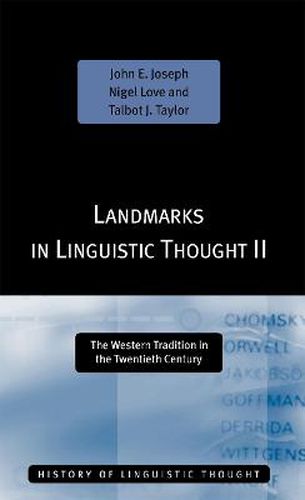Readings Newsletter
Become a Readings Member to make your shopping experience even easier.
Sign in or sign up for free!
You’re not far away from qualifying for FREE standard shipping within Australia
You’ve qualified for FREE standard shipping within Australia
The cart is loading…






Landmarks in Linguistic Thought II introduces the major issues and themes that have determined the development of Western thinking about language, meaning and communication in the twentieth century. Each chapter contains an extract from a ‘landmark’ text followed by a commentary, which places the ideas in their social and intellectual context. The book is written in an accessible and non-technical manner. The book summarizes the contribution of the key thinkers who have shaped modern linguistics. These include Austin, Chomsky, Derrida, Firth, Goffman, Harris, Jakobson, Labov, Orwell, Sapir, Whorf and Wittgenstein. This second volume follows on from Landmarks in Linguistic Thought I, which introduces the key thinkers up to the twentieth century. The series is ideal for anyone with an interest in the history of linguistics or of ideas.
$9.00 standard shipping within Australia
FREE standard shipping within Australia for orders over $100.00
Express & International shipping calculated at checkout
Landmarks in Linguistic Thought II introduces the major issues and themes that have determined the development of Western thinking about language, meaning and communication in the twentieth century. Each chapter contains an extract from a ‘landmark’ text followed by a commentary, which places the ideas in their social and intellectual context. The book is written in an accessible and non-technical manner. The book summarizes the contribution of the key thinkers who have shaped modern linguistics. These include Austin, Chomsky, Derrida, Firth, Goffman, Harris, Jakobson, Labov, Orwell, Sapir, Whorf and Wittgenstein. This second volume follows on from Landmarks in Linguistic Thought I, which introduces the key thinkers up to the twentieth century. The series is ideal for anyone with an interest in the history of linguistics or of ideas.